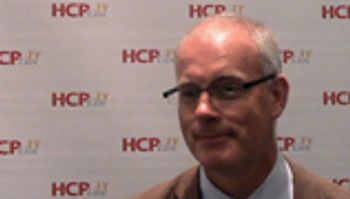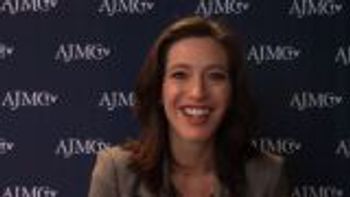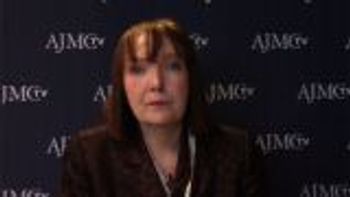
As a medium, the Internet neither helps nor harms in multiple sclerosis care - what matters is how clinicians and patients engage in that medium, according to Paul Wicks, PhD, vice president of innovation at PatientsLikeMe.

As a medium, the Internet neither helps nor harms in multiple sclerosis care - what matters is how clinicians and patients engage in that medium, according to Paul Wicks, PhD, vice president of innovation at PatientsLikeMe.

At this year's ECTRIMS conference in Boston, Alasdair Coles, MD, University of Cambridge, discussed alemtuzumab and its effectiveness in treating multiple sclerosis.

The second year of the extension study of Lemtrada (alemtuzumab) for multiple sclerosis reported positive interim results with 70% of patients not requiring a third course of treatment.

Although there have been significant advances in multiple sclerosis management, patient preferences need to be taken into account before choosing treatment, according to speakers at the 2014 ACTRIMS-ECTRIMS Joint Meeting in Boston, Massachusetts.

Patients with multiple sclerosis want to be actively engaged in their treatment decisions, which will help their long-term health and medication adherence, according to speakers at the 2014 ACTRIMS-ECTRIMS Joint Meeting in Boston, Massachusetts.

The treatment landscape for multiple sclerosis continues to get more complex month to month, which makes biomarker discovery increasingly important for treating the disease, said Suhayl Dhib-Jalbut, MD, professor at the Rutgers University Robert Wood Johnson Medical School, during his session at the 2014 Joint ACTRIMS-ECTRIMS Meeting in Boston, Massachusetts.

Although the survival rate of natalizumab-associated progressive multifocal leukoencephalopathy (PML) is better than PML in HIV patients, long-term they may need some assistance and care, Ralf Gold, Ruhr University Bochum in Germany, said at the 2014 Joint ACTRIMS-ECTRIMS Meeting in Boston, Massachusetts.

Advanced imaging techniques are becoming necessary to further understanding of the progression of multiple sclerosis, according to presenters at the 2014 Joint ACTRIMS-ECTRIMS Meeting in Boston, Massachusetts, from September 10-13.

When choosing treatment for a patient, whether he or she has a clinically isolated syndrome or clinically definite multiple sclerosis, providers need to establish a collaborative relationship, according to speakers at the 2014 Joint ACTRIMS-ECTRIMS Meeting in Boston, Massachusetts.

The gold standard for measuring treatment outcomes in multiple sclerosis (MS) is the randomized clinical trial (RCT). However, RCTs are often short-sighted and biased in their execution. Dr Maria Sormani, PhD, Biostatistics Unit, Department of Health Sciences, University of Genoa, Genoa, Italy, addressed this problem in a lecture on immunomodulatory treatment of MS.

In this video, Fred Lublin, MD, Saunders Family professor of neurology, director, The Corinne Goldsmith Dickinson Center for Multiple Sclerosis, Icahn School of Medicine at Mount Sinai, discussed the results of his poster presentation, Natalizumab Reduces the Disabling Amplitude of Multiple Sclerosis Relapses and Improves Post-relapse Residual Disability.

Clinical trials and treatment in multiple sclerosis (MS) place an unwelcome economic burden upon countries with MS prevalence. With rising costs and a growing interest in MS clinical trials from emerging countries, new studies are needed to evaluate the significance of these factors.

Fatigue and cognitive impairment are 2 of the most common health problems associated with multiple sclerosis (MS). Recent MS studies evaluate the nature of these 2 conditions not just as side effects of MS, but as chronic conditions with varying degrees of severity based on objective assessment and self-perception.

Barry Singer, MD, director, MS Center for Innovations in Care, St. Louis, MO, said that the Affordable Care Act could cause challenges in terms of coverage.

New disease-modifying drugs in multiple sclerosis (MS) show potential for improving quality-of-life (QoL) of patients with multiple sclerosis. The clinical benefits of dimethyl fumarate and PR-fampridine were discussed at a Biogen Idec-sponsored satellite symposium at the 29th Congress of the European Committee for Treatment and Research in Multiple Sclerosis (ECTRIMS).

Daniel Kantor, MD, medical director, Neurologique, immediate past president, Florida Society of Neurology, said that after an initial diagnosis of multiple sclerosis (MS) is made, providers must compare risks versus benefits when choosing which agent to treat with.

Recent discussions of risk gene variation and pharmacogenitc studies were highlighted at a parallel session during the 29th Congress of the European Committee for Treatment and Research in Multiple Sclerosis (ECTRIMS). Genome-Wide Association Studies (GWAS) have identified over 100 common risk variants in just over a quarter of observed heritability.

Predictors of long-term disability and treatment failure in multiple sclerosis were discussed at a platform presentation during the 29th Congress European Committee for Treatment and Research in Multiple Sclerosis (ECTRIMS). In the first presentation discussed here, Marzia Romeo, MD, San Raffaele Hospital, Milan, Italy, shared findings from an observational study examining the viability of early prediction of long-term treatment failure in relapsing remitting multiple sclerosis (RRMS) patients treated with disease-modifying treatments (DMT).

At a satellite symposium during the European Committee for Treatment and Research in Multiple Sclerosis (ECTRIMS) conference, presenters focused upon the usage of disease-modifying treatments (DMT) in relapsing-remitting multiple sclerosis (RRMS).

Self-reporting among multiple sclerosis (MS) patients was the focus of 2 posters during a Quality of Life (QoL) poster session at the 29th Congress of the European Committee for Treatment and Research in Multiple Sclerosis (ECTRIMS).

During a Merck Serono-sponsored satellite symposium at the 29th Annual European Committee for Treatment and Research in Multiple Sclerosis (ECTRIMS) conference, presenters shared research regarding patient engagement in treatment management for multiple sclerosis (MS). The presentation focused primarily on the relationship between patients with MS (PwMS) and their treating physicians.

In the last two decades we've seen really an explosion of the treatments we have for multiple sclerosis (MS), said Daniel Kantor, MD, medical director, Neurologique, immediate past president, Florida Society of Neurology.

Brenda Banwell, MD, Chief, Division of Neurology, Professor of Neurology, Perelman School of Medicine at the University of Pennsylvania, said that there are 3 areas of treatment associated with pediatric multiple sclerosis (MS).

In this video, Patricia Coyle, MD, director, MS Comprehensive Care Center, Stony Brook Neurosciences Institute, professor and vice chair of clinical affairs, Department of Neurology, SUNY at Stony Brook, emphasized the need to establish biomarkers for the treatment of multiple sclerosis.

259 Prospect Plains Rd, Bldg H
Cranbury, NJ 08512
© 2025 MJH Life Sciences®
All rights reserved.
